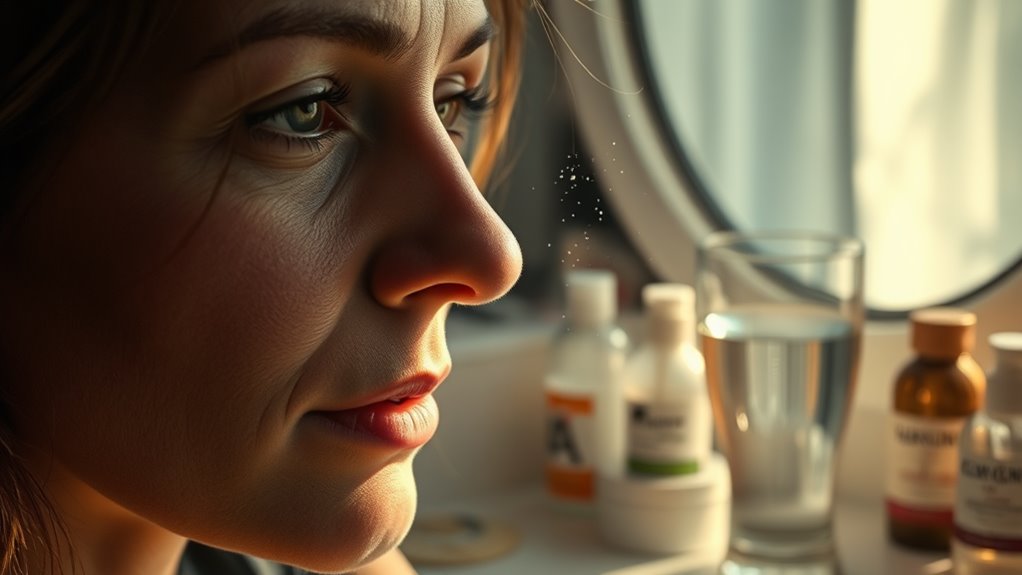The Hidden Causes of Dull Skin You Haven’t Considered
Dull skin often reflects hidden issues you might overlook. Environmental factors like pollution and UV exposure can clog pores and damage collagen, while hormonal imbalances disrupt oil production and hydration. Stress raises cortisol, leading to inflammation and poor blood flow. Nutritional choices, especially excessive sugar and dehydration, further dull your complexion. Finally, inadequate sleep hinders skin repair, contributing to that tired appearance. Discovering these underlying causes can illuminate paths toward revitalizing your skin.
Environmental Factors Impacting Skin Radiance
How do environmental factors influence your skin’s radiance?
Various dull skin causes stem from external elements like pollution, UV exposure, and climate.
Airborne pollutants can clog pores, leading to a lackluster complexion.
UV rays damage collagen and elastin, contributing to premature aging and dullness.
Additionally, extreme weather—whether hot or cold—can strip moisture, leaving your skin parched and uneven.
You might also experience increased stress levels due to environmental conditions, which can further exacerbate skin issues.
Protecting your skin from these factors through proper skincare and sun protection is essential for maintaining its vibrancy and health. Applying sunscreen correctly can significantly enhance your skin’s resilience against harmful UV rays.
The Role of Nutrition in Skin Health
What you eat plays an essential role in determining your skin’s health and appearance.
Nutrient-dense foods, rich in vitamins A, C, and E, can enhance skin vitality and protect against oxidative stress.
Omega-3 fatty acids, found in fish and flaxseeds, help maintain skin barrier function and hydration.
Conversely, excessive sugar and refined carbohydrates can lead to inflammation, contributing to dullness.
Staying hydrated is equally essential, as water supports cellular function and helps flush out toxins.
Incorporating nutrient-dense foods into your diet can significantly boost your skin’s resilience and glow.
Hormonal Imbalances and Their Effects on Complexion
Hormonal imbalances can greatly impact your skin’s health and appearance.
Fluctuations in hormones, particularly stress-related ones like cortisol, often lead to a dull complexion by disrupting oil production and blood flow.
Understanding these connections is essential for addressing your skin concerns effectively. Incorporating stress management techniques can help mitigate stress-related skin issues and improve overall skin health.
Hormones and Skin Health
Have you ever noticed how stress or menstrual cycles can affect your skin’s appearance?
Hormones play a vital role in regulating your skin’s health.
Fluctuations in estrogen, progesterone, and testosterone can lead to issues like dryness, oiliness, or acne.
For instance, increased androgen levels can stimulate sebaceous glands, resulting in excess oil production and breakouts.
Conversely, low estrogen can diminish skin elasticity and hydration, leading to a dull complexion.
Recognizing these hormonal influences can help you tailor your skincare routine and seek appropriate treatments, ensuring your skin reflects your overall well-being.
Stay informed about your hormonal health for better skin outcomes.
Stress Hormones Impacting Glow
How does stress impact your skin’s radiance?
When you’re stressed, your body releases cortisol, a hormone that can lead to increased oil production and inflammation.
This imbalance may result in breakouts and an uneven complexion, causing your skin to appear dull.
Additionally, stress can hinder blood flow, reducing the delivery of essential nutrients and oxygen to your skin cells.
Over time, this can diminish your skin’s natural glow and elasticity.
Addressing stress through relaxation techniques, exercise, or mindfulness can help restore hormonal balance and improve your skin’s overall appearance, enhancing that coveted radiant look you desire.
Stress and Its Connection to Dull Skin
Stress triggers a cascade of physiological responses, including increased cortisol production. Elevated cortisol levels can lead to inflammation, which compromises your skin’s ability to regenerate and maintain its natural barrier. This results in reduced cell turnover, causing a dull, lifeless appearance. Additionally, stress often leads to poor lifestyle choices, such as inadequate sleep and unhealthy eating, further exacerbating skin issues. You might also notice stress-induced breakouts or exacerbated skin conditions like eczema or psoriasis, all of which contribute to a lackluster complexion. Managing stress is vital for vibrant skin health. Incorporating holistic strategies can effectively alleviate stress and improve skin appearance.
Dehydration and Its Hidden Consequences
Stress isn’t the only hidden factor that can dull your skin’s appearance; dehydration plays a significant role as well.
When your body lacks adequate hydration, it prioritizes essential functions, often neglecting your skin.
This can lead to a loss of elasticity and an uneven texture.
Dehydrated skin appears more prone to fine lines and irritation, exacerbating a dull complexion.
Additionally, insufficient water intake can disrupt the skin barrier, resulting in increased transepidermal water loss.
To combat these effects, make sure you’re drinking enough water daily and consider incorporating hydrating skincare products. Unlocking radiant skin through hydration can markedly enhance your skin’s overall health and radiance.
Addressing dehydration can markedly enhance your skin’s overall health and radiance.
Sleep Quality and Skin Vitality
Could your sleep quality be the missing link to vibrant skin? Poor sleep disrupts your body’s natural repair processes, leading to dull and lifeless skin. During deep sleep, your skin undergoes critical regeneration, including collagen production and cellular repair, which are essential for maintaining a healthy complexion. Additionally, inadequate rest can also contribute to dark circles and puffy eyes, which further detracts from your overall appearance.
| Sleep Quality | Effects on Skin | Recommendations |
|---|---|---|
| Poor | Dull, uneven tone | Aim for 7-9 hours |
| Moderate | Slightly improved | Maintain a routine |
| Excellent | Radiant, youthful glow | Prioritize sleep hygiene |
Prioritize your rest for glowing skin.

